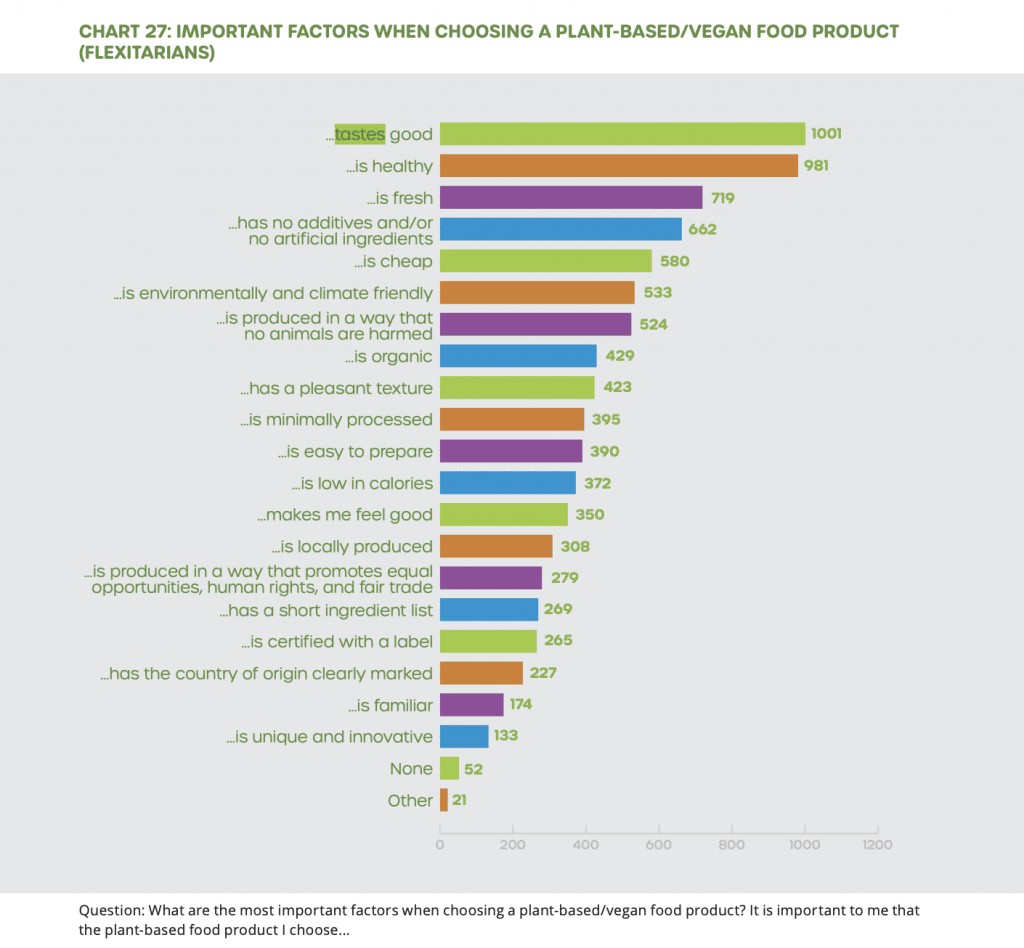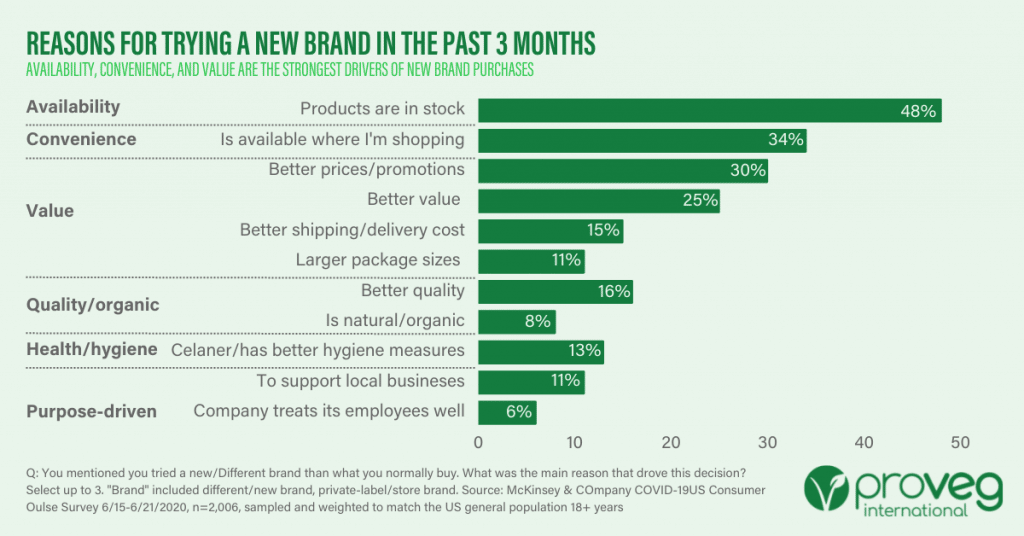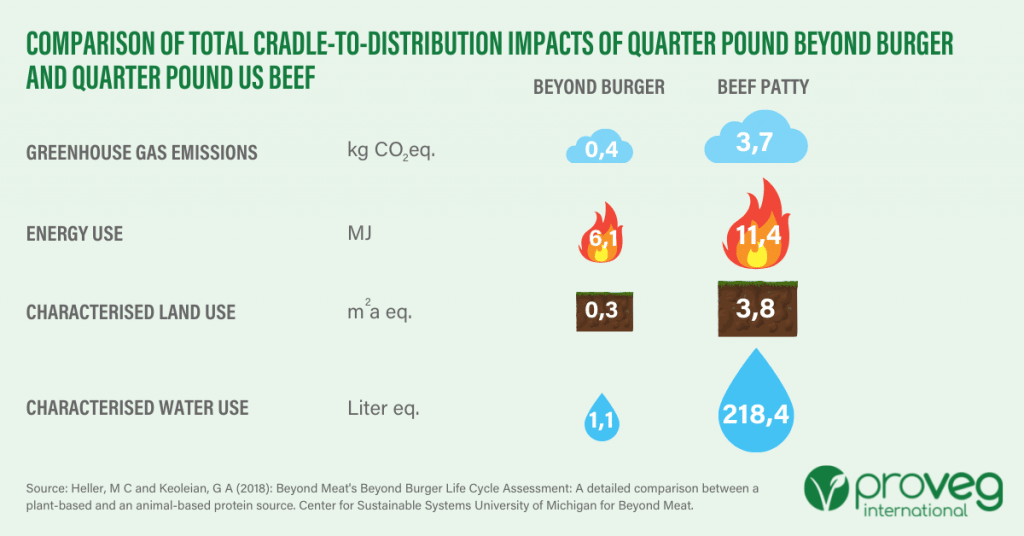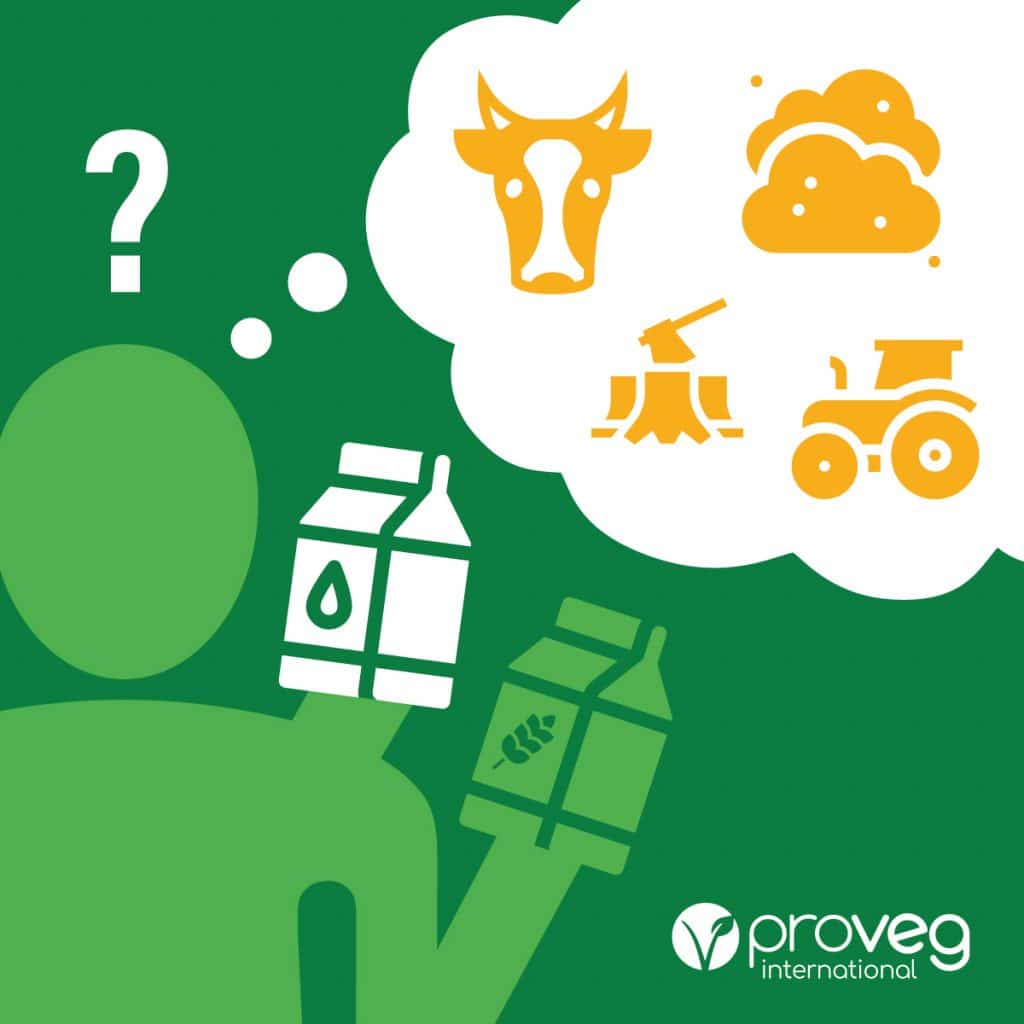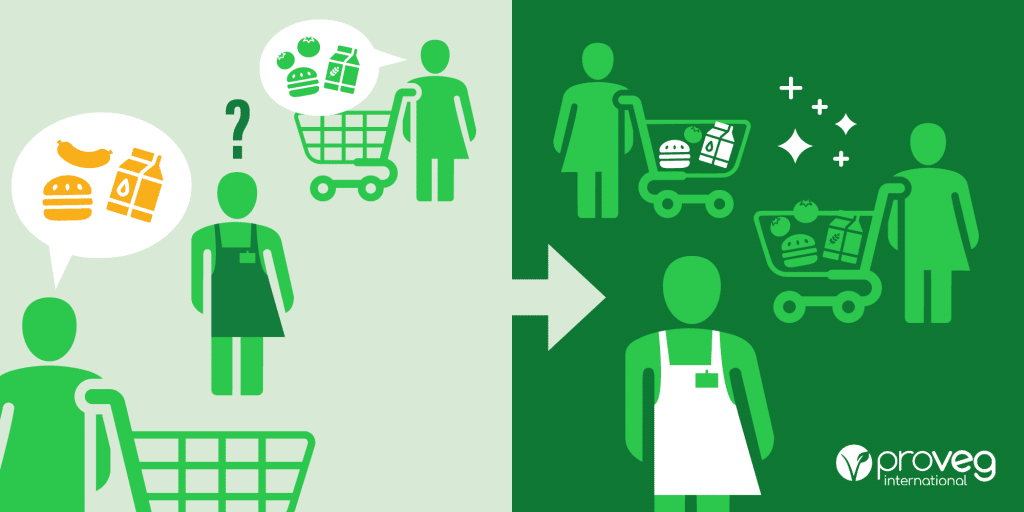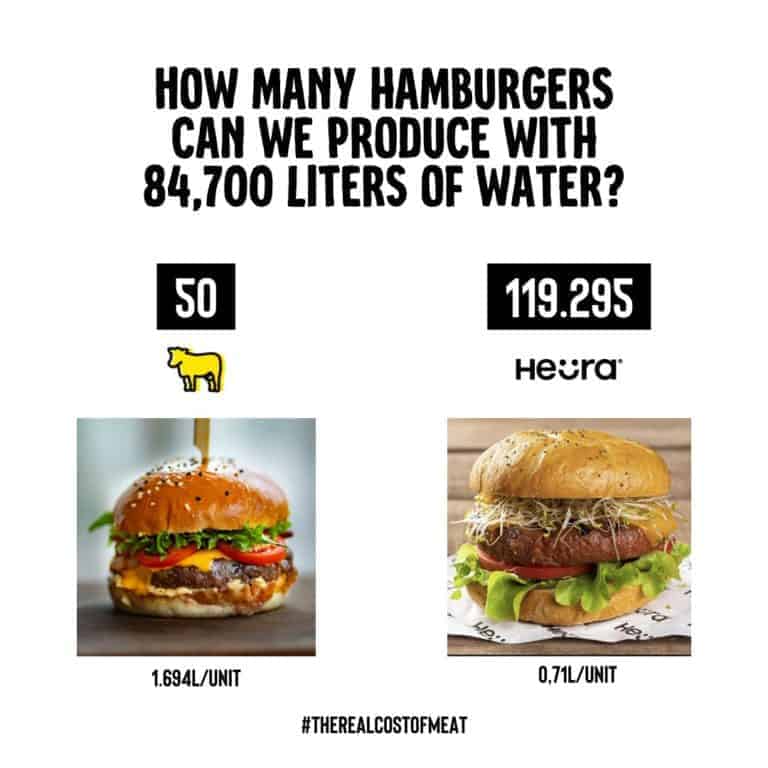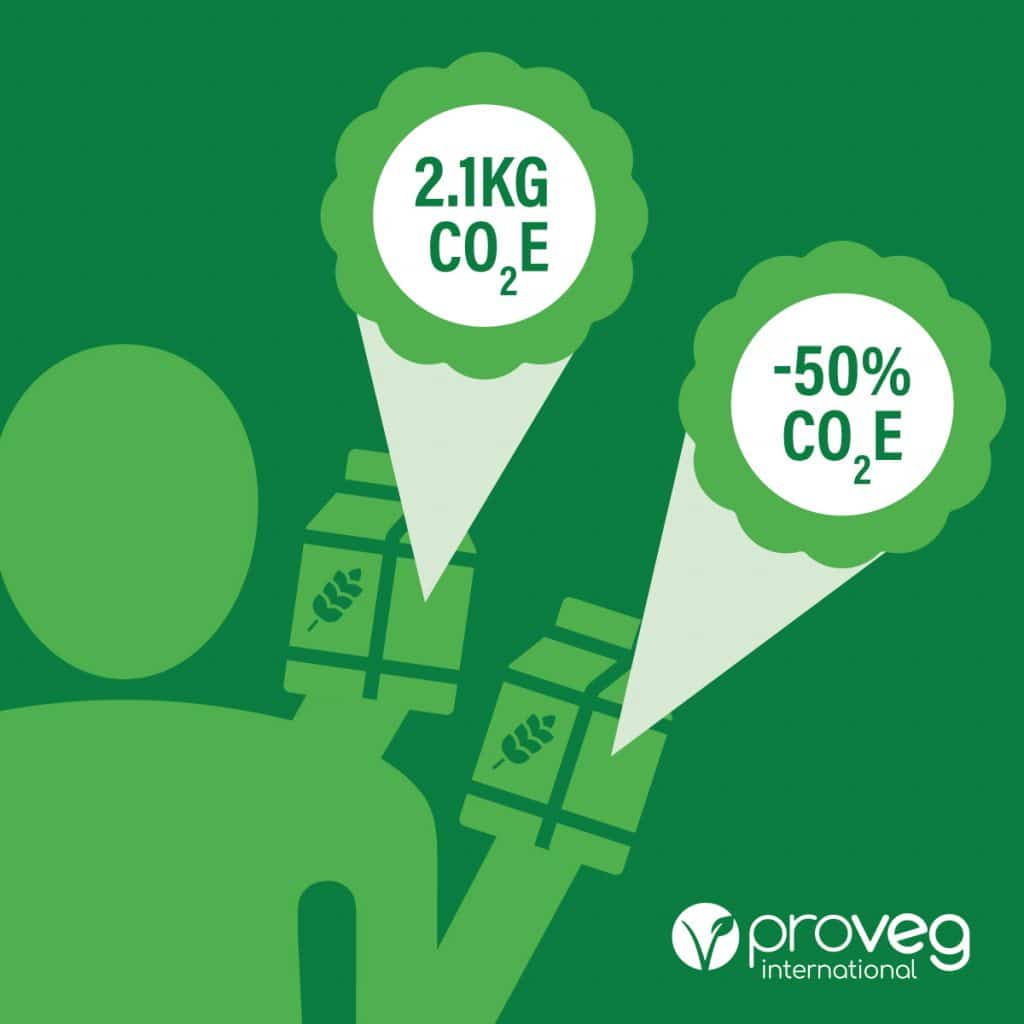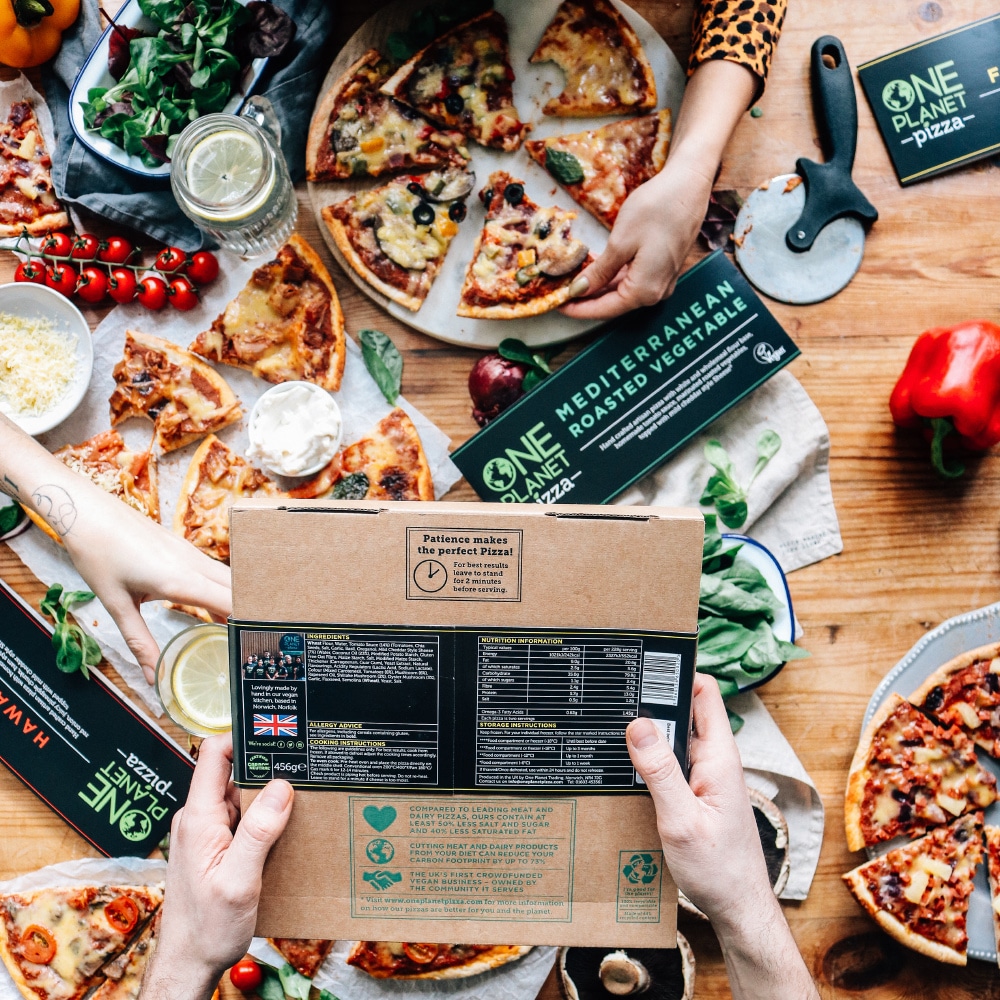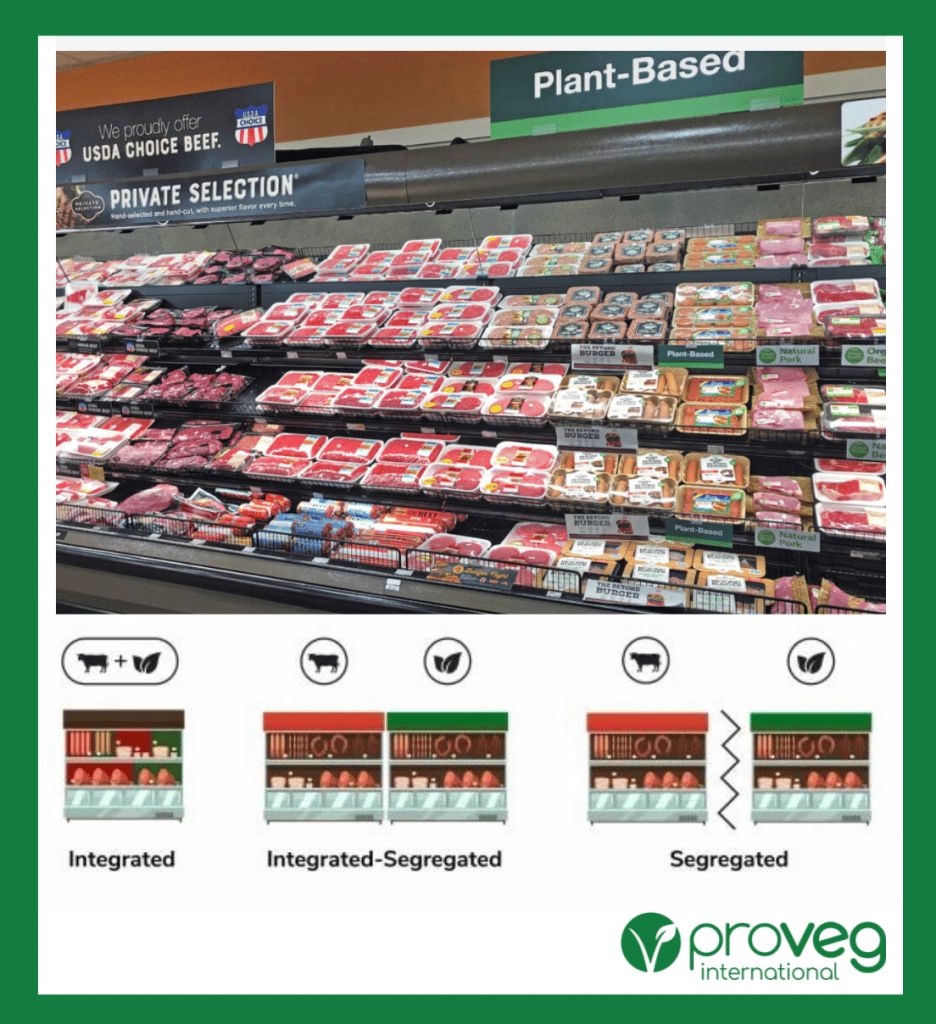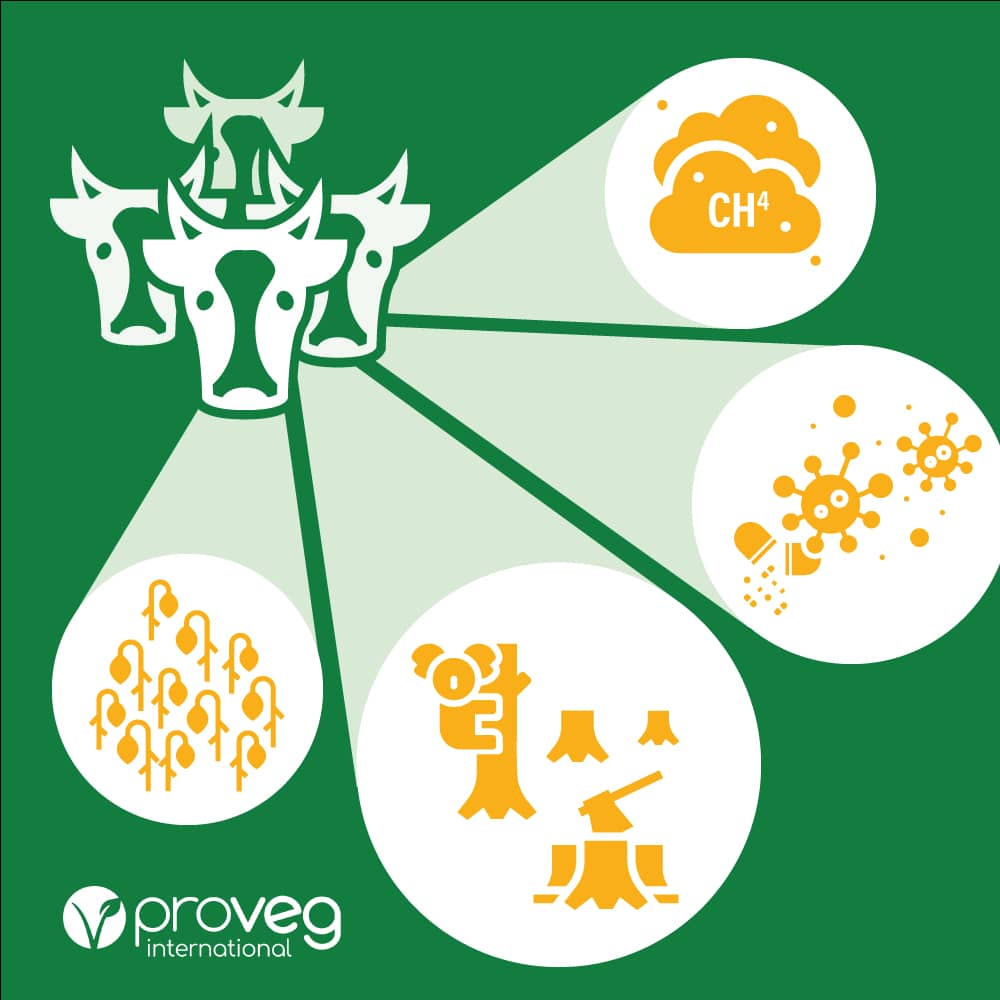Executive Summary
Both consumers and businesses are increasingly aware of the urgent need for more sustainable retail – it’s time to align your sustainability goals. Fortunately, there’s a single solution that’s convenient, popular, and scalable and which can propel you towards sustainable success: shifting to plant-rich products. This will help counter the deforestation caused by animal agriculture, cut food-related emissions in half, and help move you towards your net-zero targets.
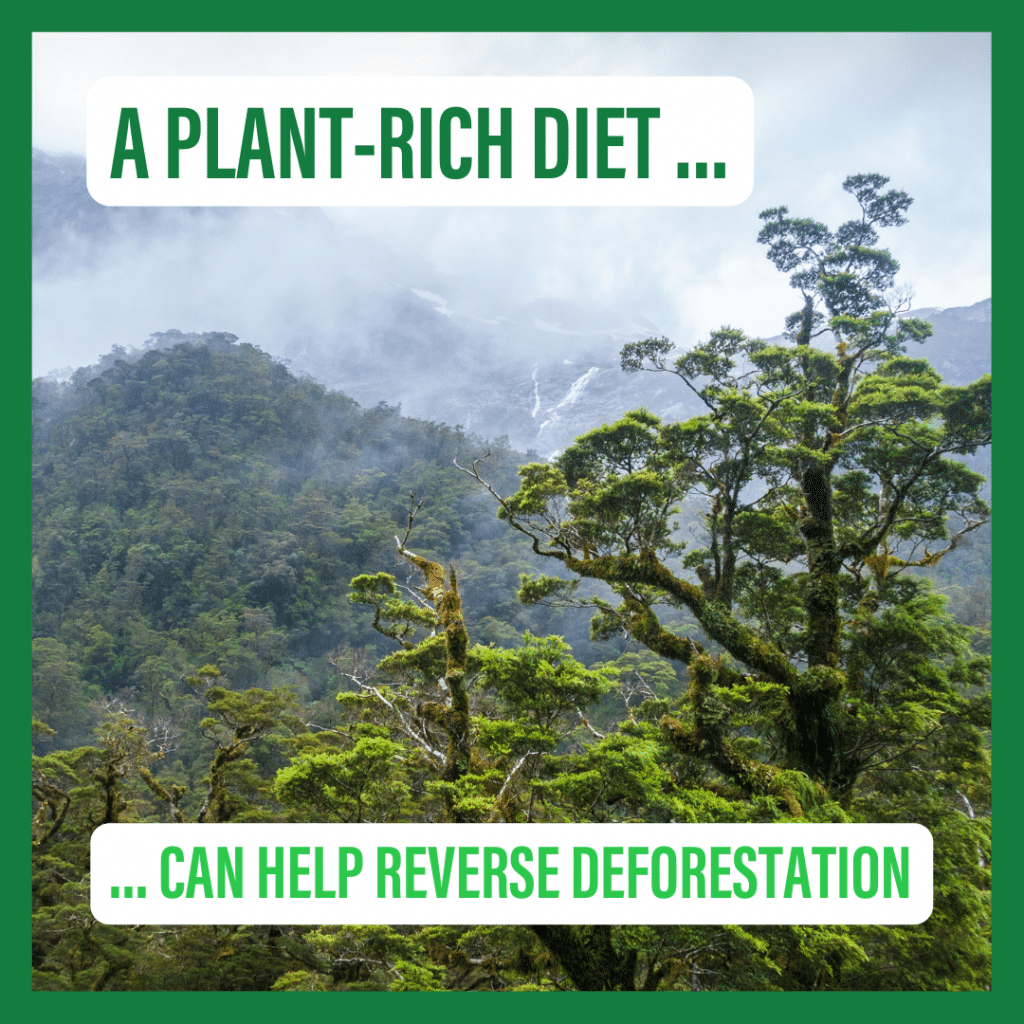
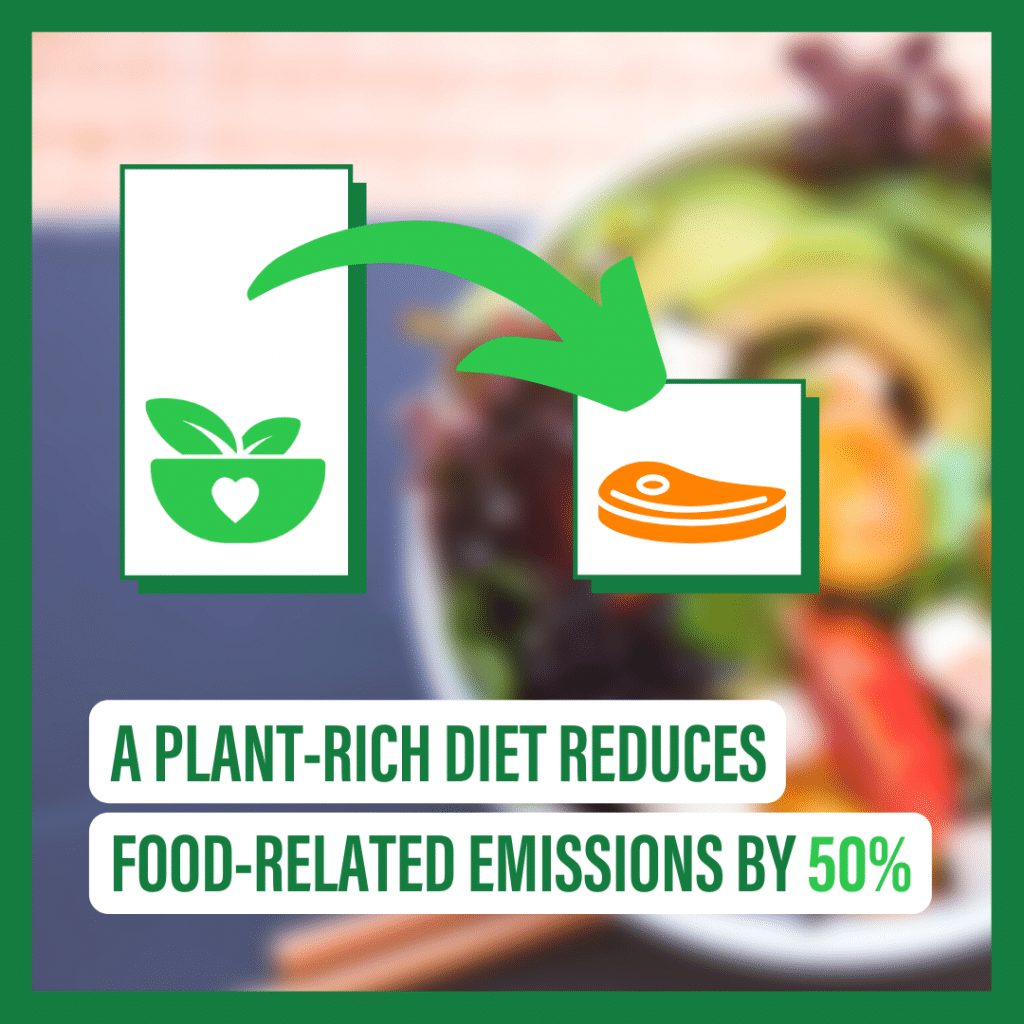
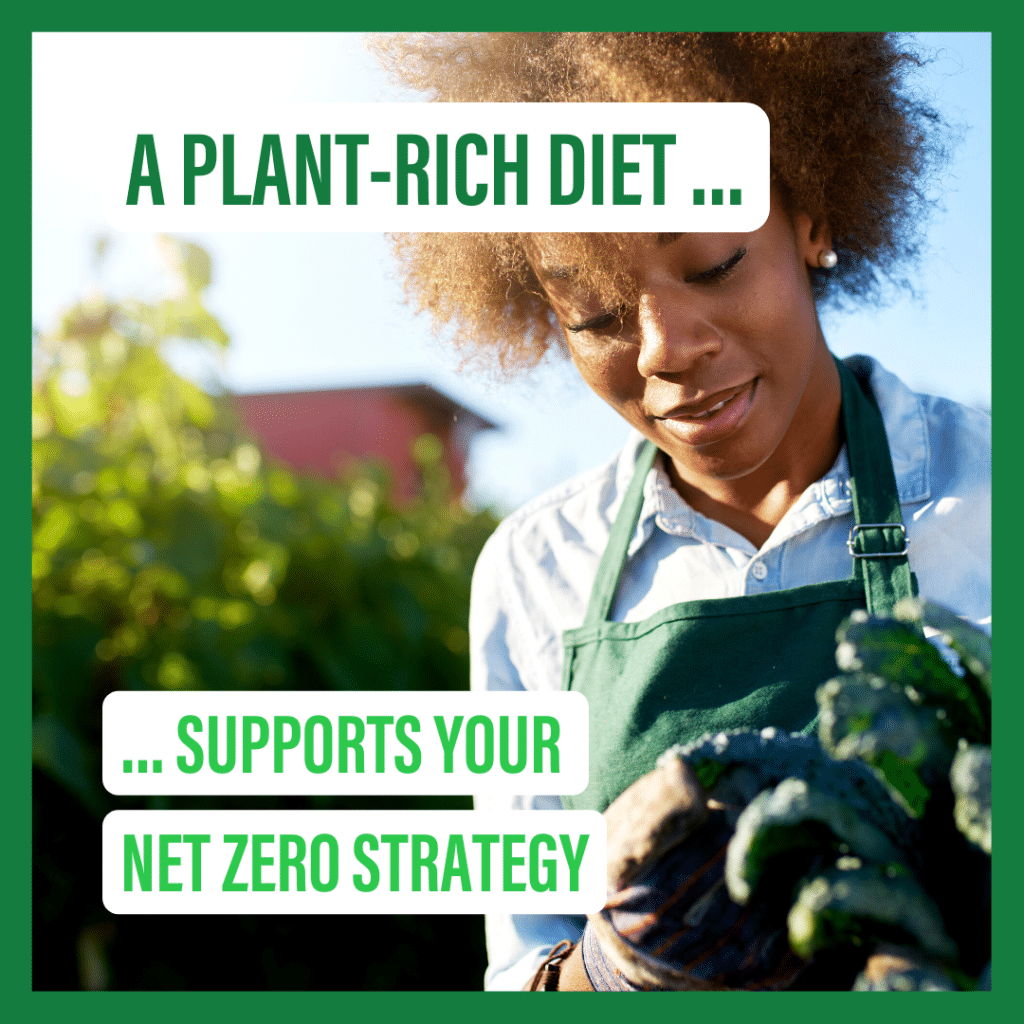
- Stock more plant-based meat alternatives:
- Shift your product-catalogue ratio away from conventional animal-based meats and towards sustainable and delicious plant-based alternatives.
- Focus on indulgence messaging – present the products as delicious.
- Price them within 5-10% of their animal-based equivalents.
- Educate and empower consumers:
- Use your community and school-outreach projects to educate consumers about the sustainability and nutrition benefits of plant-based diets – this will drive sales while reducing your organisation’s emissions footprint.
- Veganize classic products that have just one or two animal-based ingredients (such as rehydrated egg white) – this will boost your sustainability goals while broadening a product’s appeal to flexitarians and reducetarians.
- Leverage your supply chain and product recipes:
- Work with your suppliers to reduce emissions from your supply chain. Reducing the ratio of animal-based meat in ready meals is a great way to achieve this (for instance, replacing 50% of the minced beef in your recipe with lentils preserves taste, texture, and protein while improving sustainability and adding fiber).
- Source ingredients responsibly in order to improve your environmental impact – if you’re worried about soy beans causing deforestation, remember that almost 80% of them are used as animal feed, so selling more plant-based alternatives is the best way to tackle this.
- As part of your next contract negotiation, ask your suppliers to commit to becoming certified as carbon neutral – then promote this benefit on front-of-pack, in-store, and online.
- Empower your staff to accelerate sustainability – and improved long-term profits:
- Aligned incentives around improved sustainability should be written into the deliverables of everyone in your organization.
- Reduce internal friction and drive innovation by unifying the traditionally separate categories of animal- and plant-based proteins into a single protein category. Having a single protein-category manager who is committed (and accountable) to your sustainability goals will help your organization to stay nimble and adapt to shifting consumer demand.
- Support your category-management protein teams with an emotional shift towards plant-rich diets – through educational workshops, and, more importantly, tasting sessions led by plant-chefs who can show them what’s possible!
- Make choosing plant-based options easy for flexitarians:
- Make sustainable options prominent in-store by placing plant-based foods and drinks at the ends of aisles and at point-of-sale.
- Exclusively recommend plant-based alternatives/complimentary products in online messaging. Prioritize selling high-quality plant-based analogs of familiar/classic products.
- Inform your consumers about their emissions impact:
- Prioritize interventions that make sustainability convenient for consumers – for instance, better packaging or a higher ratio of plant-based products in ready meals.
- As you increase your plant-based range, use the opportunity to partner with plastic-neutral packaging suppliers.
- Reduce waste by placing plant-based alternatives alongside conventional animal-based products – this increases visibility which drives stock turnover.
- Expand your plant-based frozen and ambient ranges – they’re popular with flexitarians, are often sold in more environmentally-friendly packaging, and the range of options is now huge.
- Consider creating products with upcycled ingredients – these plant-based proteins use circular-economy principles by turning waste streams (e.g. from breweries) into tasty and nutritious foods with satisfying textures.
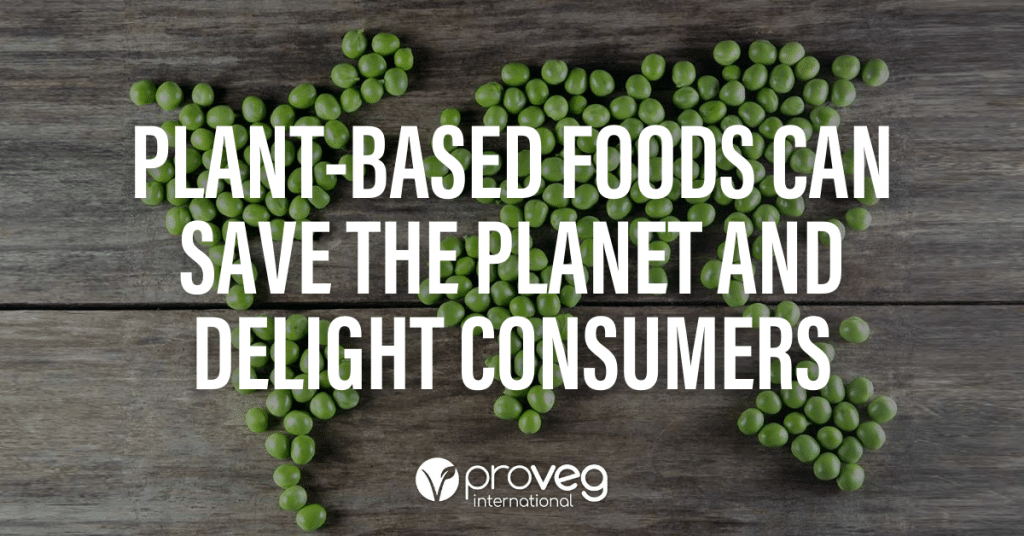
Introduction
Modern consumers care about sustainability – and it’s affecting their purchasing behavior. As CEO of Cargill, David MacLennan, puts it, “Caring about the sustainability of the planet is not only the right thing to do for people and the environment, it is also good for business”.1
However, corporate and customer-facing sustainability goals aren’t always aligned. In this paper, we’ll showcase best-practice examples of brands and retailers choosing solutions that work for everyone. You’ll learn:
- What consumers want from sustainable retail.
- Why plant-based foods are a vital solution.
- How to leverage a sustainable value chain.
- The impact of your organizational structure.
- How to encourage sustainable purchasing behaviors.
- The impact of CO2e receipts, plastic reduction, and food-waste interventions.
60% of Austrian consumers think that retailers should be doing more to protect the planet.” 2
What do consumers actually want?
The 2021 pan-EU Smart Protein survey, led by ProVeg International, found that 62% of European consumers want their food to be environmentally sustainable and climate-friendly.3 This finding is in line with Forbes research which revealed that 65% of modern consumers are seeking brands and products that are socially and environmentally responsible4, as well as with a McKinsey survey that found that half of consumers in Germany, Austria, and Switzerland have become more willing to pay a premium for sustainable goods since the beginning of the pandemic.5 “In the EU, there’s a willingness to pay more for sustainable alternatives,” explains Alexander Märdian, Head of the Innovation Hub at food consultancy DIL Technologie.
“They’re also willing to substitute meat with plant-alternatives,” Maerdian adds. Data from the pan-EU Smart Protein survey confirms this – we found that around 40% of European consumers are now following a diet that either excludes or significantly reduces meat consumption.
However, at the moment, most consumers are going plant-based primarily for health motivations.6 There’s an opportunity here for brands and retailers to help consumers achieve two goals in one since eating plant-based is generally both healthier and more sustainable than a conventional diet. Win-win. But plant-based foods are often priced at a premium (see our white paper: ‘3 ways to achieve price parity and drive sales’). So, how flexible is consumer spending when it comes to sustainability?
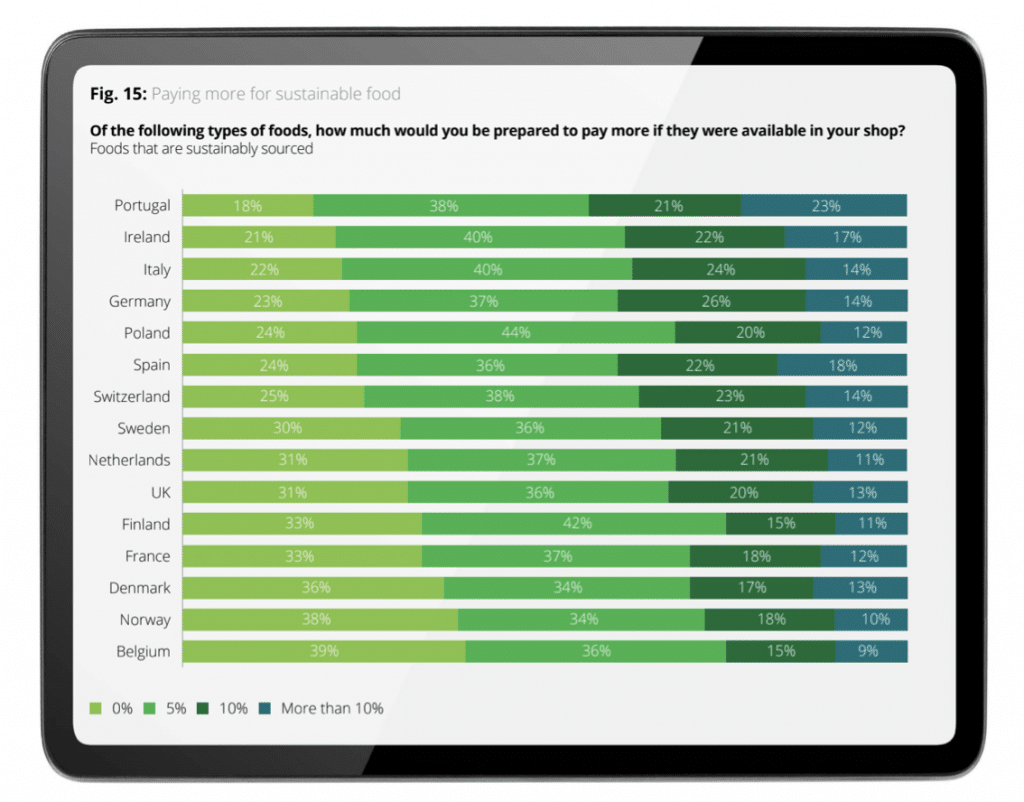
While research by Deloitte found that most consumers (70%) say they’re willing to pay a 5% sustainability premium, the price disparity between sustainable and unsustainable products is often much larger. This may explain why the same study found that only 29% of consumers are willing to choose sustainability over affordability.8 Similarly, the Smart Protein study found that, assuming an animal-based and plant-based meat product tasted equally good, less than 25% of consumers would be willing to pay more for the more sustainable plant-based product.9
In other words, although consumers are becoming more environmentally focused, they’re still highly price sensitive. The majority are only willing to pay 5-10% more for sustainable products.
Retailers need to hook consumers using the primary motivators of price and taste11 in order to make them receptive to the benefits of health and sustainability.12
“If a product is presented as delicious, it’s more likely someone will consider it on-shelf and take the time to read through health and sustainability claims,” explains Erin Ransom, SVP of Growth at Tofurky. “If you stress the ecological values too much, people are put off,” agrees Balázs Tarsoly, CEO of Branding Cuisine. “It has to be a balance between the fun part and the ecological part. Oatly is famous for making funny yet political messaging.”
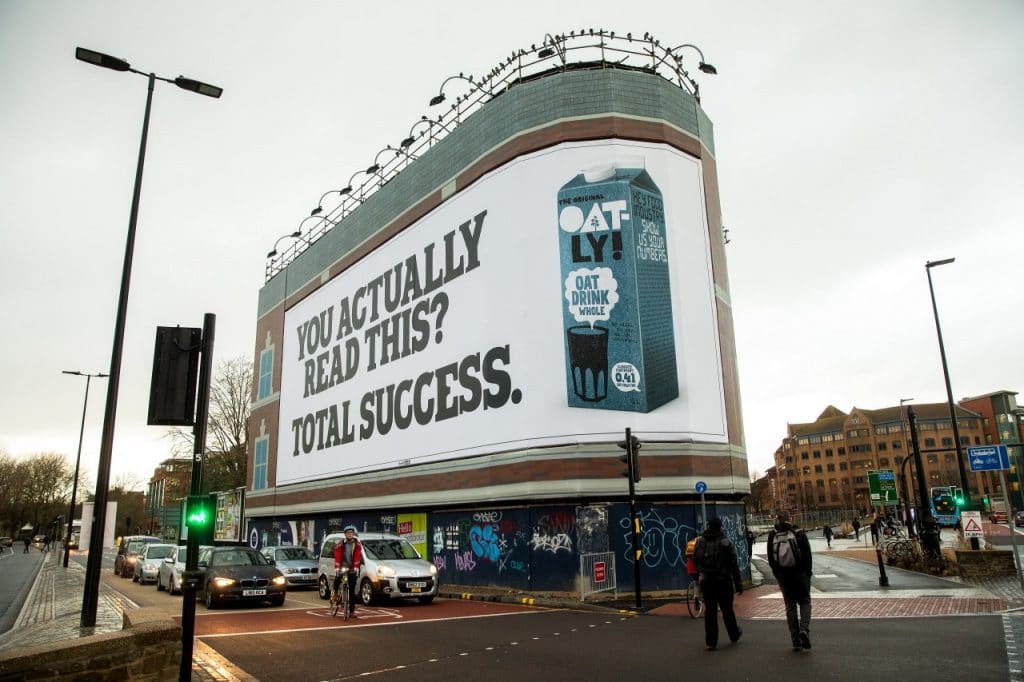
Case study: Knorr promoting plant-based sustainability in Poland
Since 2020, Unilever’s food brand Knorr has been running an educational campaign called PrzyGotujmy Lepszy Świat (‘Let’s cook a better world’) that is aimed at school children in Poland. ProVeg is a key partner in this initiative, working with teachers to develop interactive lessons and workshops.
Children learn about climate change, what and how much is needed to produce food, and how this production affects the environment. Once a problem is defined, they work together to find solutions – learning how to make meals that are good for them and the planet. Throughout the six-month program, the children and their parents prepare plant-based meals with specific plant products, for which they receive points. In this way, they get to know new vegetables, fruits, grains, and pulses, and ultimately learn that even a small change on their plate can be a big change for our planet!
More than 43,000 children took part in the first edition of the program, preparing more than 84,000 plant-based meals together with their parents.
As part of the prizes for the five winning schools, ProVeg, together with Knorr chefs, conducted training for 40 kitchen staff on how to prepare plant-based meals for children.
The second edition has been running since October 2021, reaching even more children this time around (an estimated 56,000), and we’re looking forward to more great sustainability results for everyone involved.
If your company does outreach work in schools and local communities, plant-based diets should be a key part of your messaging. By educating consumers about the environmental and nutritional benefits of plant-based foods, you can boost your reputation as a thought leader, and drive demand for products that will support your sustainability goals.
ProVeg works with international decision-making bodies, governments, food producers, retailers, investors, the media, and the general public to help the world transition to a society and economy that are less dependent on animal agriculture and more sustainable for humans, animals, and our planet. To benefit from our expertise in sustainable plant-based food production and retail, give us a shout at [email protected].
Actions
- Stock more plant-based meat alternatives.
- Focus on indulgence messaging – present your products as delicious.
- Price them within 5-10% of their animal-based equivalents.
- Use your community and school-outreach projects to educate consumers about the sustainability and nutrition benefits of plant-based diets – this will drive sales of products and reduce your organisation’s emissions footprint.
In the next section, we’ll outline what steps retailers can take to promote foods that are profitable, popular, and sustainable.
The plant-based food solution
“Transport is only about 6% of a product’s emissions, whereas agriculture is 80%-90%. So it’s not about where your product comes from, it’s about what ingredients you use,” explains Jerome Pagnier, Co-founder and CEO of WiseFins. When you look at the data, the solution becomes clear: to reduce emissions, go plant-based.
A 2021 study comparing the lifecycle impacts of Beyond Burgers and Impossible Burgers to those of beef burgers showed that the plant-based burgers substantially reduced land use, water consumption, and greenhouse gas (GHG) emissions.16 These figures are supported by a separate study by the University of Michigan that shows the significant environmental benefits of choosing a plant-based Beyond burger over a conventional beef burger.17 Similarly, a 2020 study by German brand Rügenwalder Mühle compared the environmental impact of their vegan cold cut Schinken Spicker (imitation ham) product to its animal-based counterpart. The vegan product reduced CO2-equivalent emissions for each pack by 43% (reducing them from 0.56kg for the animal-meat version to 0.24kg for the plant-based version).18
These findings can be extrapolated across plant-based alternatives in general. A recent life-cycle analysis of 56 meat substitutes showed that their GHG emissions were similar, irrespective of the main source of protein (soy, wheat, wheat/soya, nuts).19 Per edible kilogram, plant-based meats also use 72-99% less water than conventional meat20, and cause 51-91% less aquatic nutrient pollution.21 In other words, consumers can be confident that virtually any plant-based alternative is going to be much better for the environment overall than its animal-based equivalent.
By choosing a plant-based burger instead of a regular beef burger, consumers reduce impacts across every category studied between 87% and 96%.”22
Food is one of the biggest contributors to global anthropogenic GHG emissions – with emissions from livestock accounting for 20% of the global total. Intensively produced animal meat and dairy is the most damaging.23
The most effective way to reduce your environmental footprint as a retailer is to reduce the proportion of animal-based products you sell, and increase the ratio of plant-based alternatives.
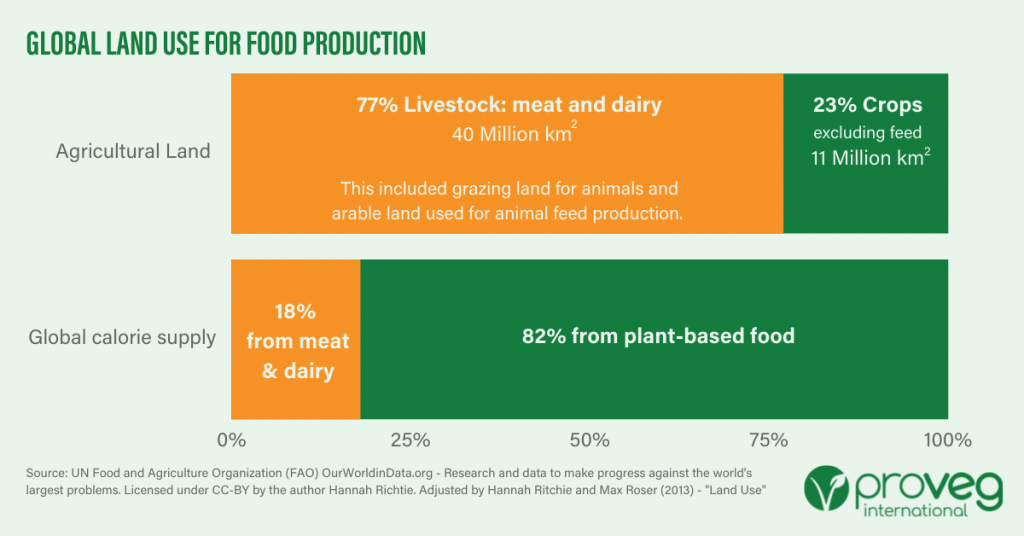
But how do you do this? “Sustainability can never come at the expense of taste,” explains Cedric Verstraeten, Global Director of Value Creation at AB InBev. “Taste and cost come first,” he adds – confirming what the data shows.27
So, if sustainability ranks below other consumer motivations, how can retailers meet these interconnecting needs? The solution is simple: variety.
Having a wide variety of plant-based alternatives is essential for a number of reasons. First, it caters to a diversity of tastes. Second, it provides a greater range of health benefits. And third, and equally importantly, it taps into a vital psychological phenomenon called the availability heuristic which reflects our tendency to use information that comes to mind quickly and easily when we make decisions.28
The best way to support flexitarians reduce their meat intake is probably through interventions that make it easy to turn intentions into action: increasing the availability of tasty plant-based products, making it easy to identify stores or restaurants that have a wide range of plant-based options, or making the price of plant-based foods more accessible.”
Nutritional considerations
Can a plant-based diet meet your consumers’ health needs? Absolutely! Just be sure to provide a wide variety, and market it on the multiple angles of taste, health, and sustainability.
“Much of the plant-based food narrative relies on health, but many of these products contain a lot of E-numbers and have long labels,” warns Robert Lambert, Head of Marketing & Collaborations at food supplier Ulrick & Short. “The idea is great for sustainability,” agrees Lourlee Briones, Global Business Development Manager at ingredient supplier Capol.de, “But the additives needed to copy traditional products can mean that a product being vegan is not automatically a healthy alternative”.
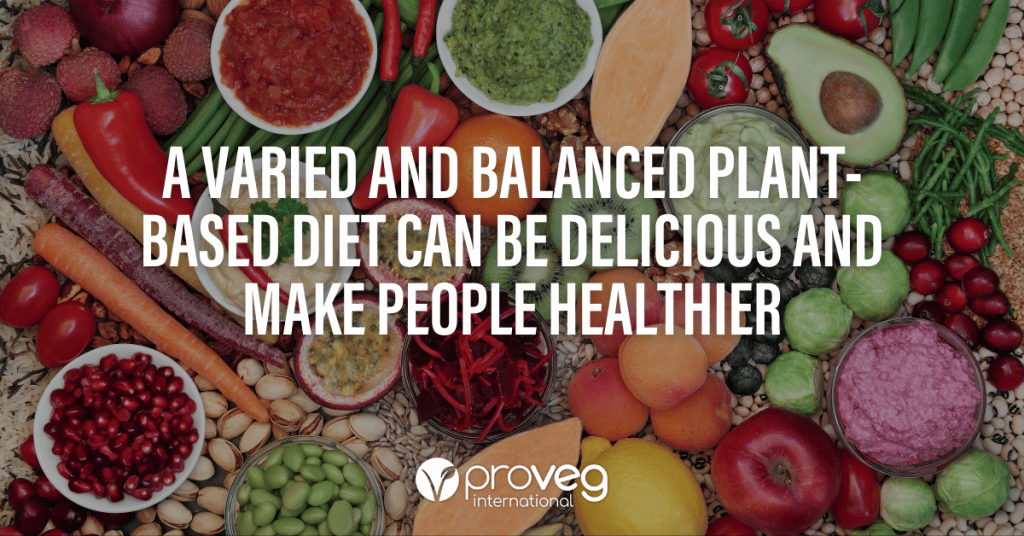
The solution? Again, it’s all about variety. Any products with significant additives should be eaten in moderation – whether they’re animal-based or plant-based. By providing a range of convenient and indulgent plant-based products alongside healthier plant-based alternatives and whole-food recipes, you can support your customers in getting their optimal nutrition in a planet-friendly way.
Case Study: Rügenwalder Mühle removes egg whites to veganize its plant-based alternatives
Since 2012, ProVeg has been a trusted partner of Rügenwalder Mühle, one of the biggest and best-known meat-processing companies in Germany. We’ve supported them in their ongoing and trail-blazing transition towards more vegan options. A key part of this success has been to remove eggs – and in particular, egg whites – from their plant-based alternatives.
Rehydrated egg whites have long been a common ingredient in meat alternatives. Veganizing them makes good business sense as these products are already aimed at the plant-based sector. The sustainability savings are huge too, since rehydrated egg white is a very carbon-intensive ingredient and causes much animal suffering. Rehydrated egg white causes over seven times more emissions than regular eggs.
I can imagine twenty years from now, we’ll be working without meat.”
Rügenwalder Mühle has been re-orientating their entire business strategy for several years now and has positioned itself as a global leader in the alt-meat sector. Sales of their plant-based range increased by 50% in the first half of 2020.29 Rügenwalder now has a range of 24 veggie products, of which 10 are vegan. Their self-declared aim is to veganize all their vegetarian products.
In the course of the development of our meat-free products, we have consulted ProVeg in many specific questions, especially when it comes to replacing ingredients of animal origin [particularly eggs] with vegetable alternatives. Also for the future, we are focusing on constructive exchange to further improve our products.”30
Vegan and vegetarian products have accounted for over a third of Rügenwalder Mühle’s total revenue since 2019, and they are continuing expand that ratio in order to serve modern consumer preferences.
In the area of plant proteins, we expect dynamic growth in the coming years. Everything points to the fact that the trend towards vegan and vegetarian nutrition has arrived in mainstream society.”31
ProVeg helped Rügenwalder Mühle to remove the egg white from three of their plant-based alternative products. The results have been hugely positive – with the products continuing to be popular with existing consumers, and now accessible to the growing number of people seeking fully veganised products. The change also delivered significant sustainability benefits – reducing emissions, reducing water use, and reducing animal suffering.
For more information on veganizing your classic ranges, check out our white paper ‘Lessons learned from brands who veganised classic products’, or get in touch with us at [email protected].
Actions
- Reduce your organisation’s greenhouse-gas footprint by increasing the proportion of plant-based meat alternatives in your product range.
- Veganize classic products that have just one or two animal-based ingredients (such as rehydrated egg white) – this will boost your sustainability goals while broadening the product’s appeal to flexitarians and reducetarians.
Leveraging your supply chain in order to reduce animal-based ingredients
Two-thirds of our greenhouse-gas model sits in the agricultural supply chain…We could change our offices to renewables, all drive electric cars, but it’s pointless unless we address the major issue…We have to tackle the agricultural supply chain.”32
Consumers increasingly want companies to be sustainable – but it’s impossible for individuals to scrutinize a product’s entire value chain, especially as many of the stages involved are invisible.
In some instances, you’ll be taking actions that aren’t seen, but they’re integral to your internal sustainability accounting and thus your broader external picture.
“Most of our customers have no idea what sustainable soy is,” says Frank Giezen, Co-founder of leading European food manufacturer Ojah. “Maybe only ten percent of the public is interested – so for us, local sourcing, choosing 100% European soy, was a company value. We want to control the impact of all the logistics within our supply chain.”
In other instances, you may be seeking carbon-neutral certification for a product, or another public-facing sustainability claim you want to substantiate. Working with your suppliers is an essential part of reducing food-related emissions – and many companies are already making positive changes.
We’re considering our role in the sustainable supply chain because our customers are asking for it.”
Case study: Penny’s “Food for Future” label
Penny is a German discounter with thousands of supermarkets across six European countries. The company has announced plans to cut emissions by 30% by 2030, and to be carbon neutral by 2040. As part of their sustainability strategy, they introduced their ‘Food for Future’ private label in 2020 – becoming one of the first discounters in Germany to have a cross-category plant-based private label.
Because the foods are plant-based, they produce fewer food-to-fork emissions. On top of this, Penny is further reducing the emissions footprint of the range by investing in reforestation projects through ClimatePartner, which estimates that the initiative will save sixteen thousand tons of CO2 each year. As a result, they’re able to certify products as carbon neutral.
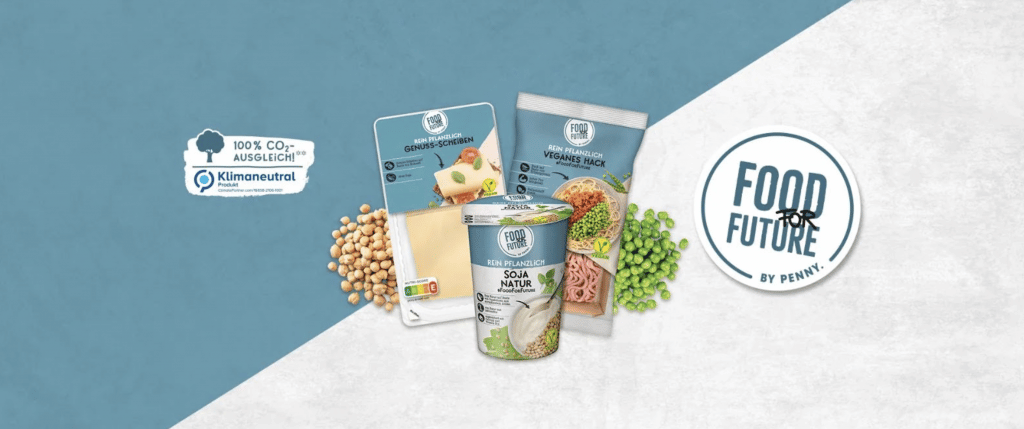
We will continuously expand our range of vegetarian/vegan foods and thus systematically continue to pursue our ambitious climate strategy.”35
If you want help expanding your organisation’s range of plant-based foods, ProVeg has you covered. We work with companies along the entire value chain, which gives us unique insights into the key challenges, hurdles, and opportunities at every stage of the journey as you take your product to market. Reach out to us at [email protected].
Actions
- Work with your suppliers to reduce emissions from your supply chain. Reducing the ratio of animal-based meat in ready meals is a great way to achieve this (for instance, replacing 50% of the minced beef in your recipe with lentils preserves taste, texture, and protein while improving sustainability and adding fiber).
- Source ingredients responsibly in order to improve your environmental impact – if you’re worried about soy beans causing deforestation, remember that almost 80% of them are used as animal feed, so selling more plant-based alternatives is the best way to tackle this issue.
- As part of your next contract negotiation, ask your suppliers to commit to becoming certified as carbon neutral – then promote this benefit on front-of-pack, in-store, and online.
Empowering your teams to promote plant-based solutions
People want guidance, not rhetoric. They need to know what the plan of action is and how it will be implemented. They want to be given responsibility to help solve the problem and the authority to act on it.”36
As a retailer or brand, there are two key ways you can empower your teams to deliver sustainable and profitable strategies at speed and scale. The first is about internal transparency and the second is about organizational structure.
Internal transparency is a powerful tool for change. If your organization is serious about sustainability, then it’s not enough to have a sustainability team making suggestions to other departments. Every department and every employee should have sustainability goals written into their core deliverables. By aligning everyone’s incentives, you’ll reduce friction and accelerate progress.
It’s essential that you equip your sustainability/CSR teams with all the data on revenues and margins that your category managers have. When you give them financial and strategic transparency across your entire organization, you’re empowering them to make recommendations that will strengthen your bottom line. This will save time and deliver better outcomes for your business, your customers, and the planet. (We’ve heard on the grapevine from several European major retailers that this isn’t happening enough right now – CSR teams aren’t being given access to margins and sales data. How can they win over category managers without that?).38
Companies shouldn’t have a CSR team. If you have a CSR team, it means sustainability isn’t a core value of your business – it’s an entity like any other department. The reality is that if you want to make a holistic impact it has to be a core value of the company – that every department of the company thinks about. Every department needs to have environmental KPIs.”
Regarding organizational structure, some retailers are already making positive changes – namely, by creating a single-category management team to handle protein. This removes friction between the animal-based and plant-based buying teams and aligns everyone’s incentives. Creating a single team with a common goal will help your business to increase its proportion of plant-based alternatives faster, integrate them into flexitarian aisles, and drive great outcomes for both sustainability and revenue.
Case study: Coop Netherlands embraces protein-category managers
“We used to have differentiated roles for animal- and plant-based meats,” explains Wim van den Burg, Team Lead Category Management at Coop Netherlands, “but now we have one person responsible for the protein range.
“When you look at the category manager that does [animal-based] meat, in general those people are more traditional and slower to change. But plant-based managers are more pro-innovation. When you combine that, you have the best meat-responsible progress strategy.”
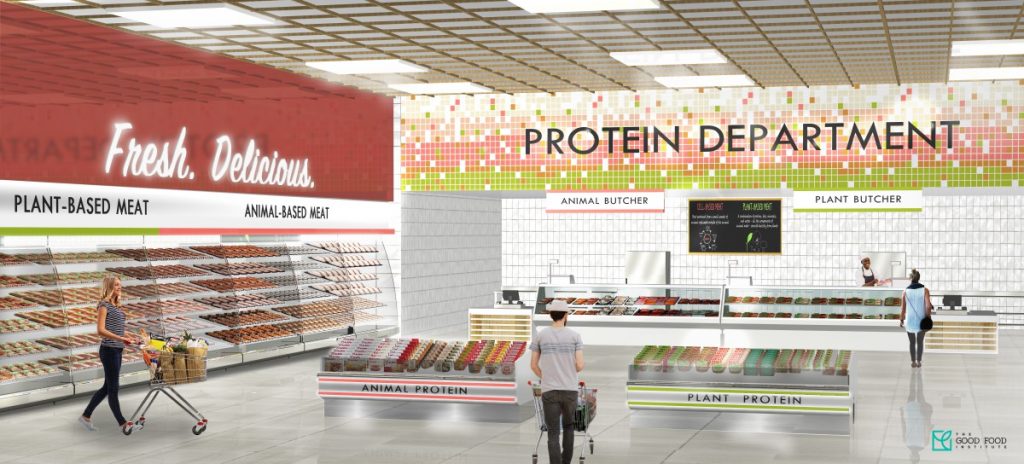
“With our own private label, we’ve started putting it into the [animal-based] meat space. It’s yielding sales, but proving an emotional challenge for retailer managers.”
Change management is an important part of any new initiative. ProVeg is here to support your teams with educational resources, trainings, and workshops, as well as some examples of best practices to help them embrace the best of plant-based food retail. We’ve provided training and support for retailers across Europe, including Aldi, Lidl, Hema, and Carrefour, as well as numerous other brands. Get in touch with us at [email protected].
Actions
- Align incentives around sustainability – everyone in your organization should have improving sustainability written into their deliverables.
- Reduce internal friction and drive innovation by replacing the traditional model of separate animal- and plant-based protein categories with a single protein category. Having a single protein-category manager who is committed (and accountable) to your sustainability goals will help your organization to stay nimble and adapt to shifting consumer demand.
- Support your category-management protein teams with an emotional shift towards plant-rich diets – through educational workshops, and more importantly, tasting sessions led by plant-chefs who can show them what’s possible!
Encouraging your consumers
According to Dr. Bianchi at the Behavioral Insights Team, there are three key interventions that retailers can take to support sustainable consumerism for everyone’s benefit:40
- Positioning (in-store): placing plant-based options at point-of-sale will make sustainable options more prominent.
- Swaps (online): ensure that your online store’s algorithms always recommend plant-based alternatives or complementary products.
- Labels: use simple labels to help customers identify stores and products that are healthier and more sustainable.
There is promising evidence that increasing the availability of healthy and sustainable foods, repositioning healthy and sustainable foods to be more prominent at point of purchase, or offering swaps could help people make more sustainable choices.”41
Some consumers are already won over by the indulgence, health, or environmental benefits of plant-based foods. Many others are trying them out of curiosity.42 Retailers and brands can play an educational role in supporting plant-rich diets for these consumers on an ongoing basis.
“On our social media channels, we do ‘good news Fridays’, where we inform and educate people with good news about plant-based foods and sustainability,” explains Bernat Añaños, Co-Founder of Heura Foods. “On Wednesdays, we focus on debunking myths and using hard data to raise awareness.”
ProVeg has extensive knowledge of flexitarian consumers in Europe, from general preferences to specific consumer sentiments regarding particular product categories. We regularly help retailers and brands with their plant-based merchandising, educational social media, and product development. Get in touch with us at [email protected].
Case Study: Bio Company’s plant-based lunches
In 2019, German retailer Bio Company decided to launch a new line of convenience food. They commissioned the food agency Branding Cuisine to research and develop the new range.
The brief was to “do something ecological and easy to grab at the entrances/exits of the bakery shops. Quick, sustainable lunches for business people,” says Balázs Tarsoly, CEO of Branding Cuisine. “Originally, Bio Company were imagining meat and fish products, but we presented them with a fully vegan range. When they tasted it, they were amazed, and we managed to get everyone onboard. Its sales outperformed everyone’s expectations and it’s still selling very well.”
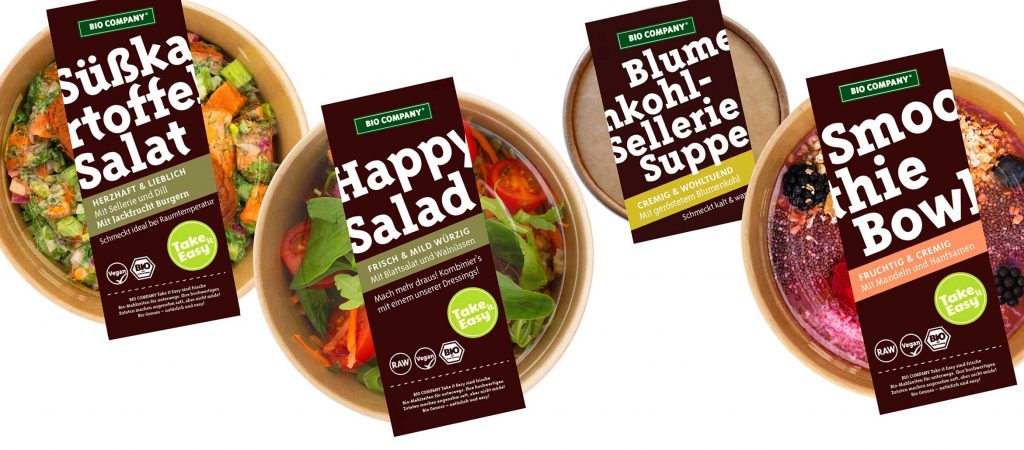
Making your convenience ranges and own-label products plant-based is a great way for retailers to deliver sustainability wins for both their consumers and their business in a delicious way. “In ready-to-eat meals we’re seeing the evolution quicker,” agrees Wim van den Burg from Coop Netherlands.
Just make sure you go in with the right attitude when commissioning these products. As Tarsoly adds, “To think ‘oh, let’s do something for the vegans’ is not the right perspective. You should make something that tastes great and is fully satisfying, life-style appropriate, and international, and also happens to be vegan.” In other words, you shouldn’t compromise on taste when you’re creating a sustainable product that you want customers to love.
Plant-based alternatives done well are delicious and inherently more sustainable than animal-based products. For more insights into plant-based R&D options, check out our white paper ‘7 key development strategies for plant-based products’.
Actions
- Make sustainable options prominent in-store by placing plant-based foods and drinks at the ends of aisles and at point-of-sale.
- Exclusively recommend plant-based alternatives/complementary products in online messaging.
- Use simple and accredited environmental-impact labels in order to nudge consumers towards sustainable foods.
Cultured meat – coming soon?
In this section, we’ll briefly cover what cultured meat is and why retailers should be anticipating its arrival on international markets in the next 12-18 months.
Cultured meat, also known as cultivated or cell-based meat, is animal meat that is produced from animal cells rather than from whole live animals. Cells are the building blocks of life. By culturing cells to produce meat, fish, and seafood, the raising and slaughtering of animals can be avoided.
Cellular agriculture has the potential to reduce the climate impact of food by up to 92%.45
To produce meat and seafood, stem cells are first sampled from animals through a biopsy. These cells are then fed with nutrients in large vats, also known as cultivators, where they multiply and differentiate. As they grow, they become muscle tissue, which is the main component of meat. The aim is to provide people with the meat that they know and like but with numerous human health benefits, a lighter impact on the environment, and a massive reduction in animal use and slaughter.
Conventional agrifood companies are increasingly exploring the possibilities of cellular agriculture in order to make our food system more sustainable and less dependent on animal farming. A growing number of universities, along with more than 100 companies and startups around the world, including some of the world’s leading meat producers, are currently working on developing cellular-agriculture products.

Cultured meat is set to hit US retail shelves in 2022.47 Surveys suggest that about half of consumers will be open to trying cultured meat once regulatory approval has assuaged safety concerns.48Cellular agriculture has the potential to reduce the climate impact of food by up to 92%.49 According to the consulting firm Kearney, cultured meat could represent 35% of global meat consumption by as early as 2040.50
Actions
- Make sure that buyers from your organization attend food retail conferences and expos in your target sectors, so you can taste-test these new products for yourself
- Start discussing cellular agriculture and cultured-meat products in your newsletters in order to to warm consumers up to the taste, texture, health, and environmental benefits.
- Involve your deli-counter buyers in your research and planning, as cellular agriculture products will present an opportunity for whole-cut meats.
- Ask your R&D teams to keep you updated on hybrid products that combine plant protein with cultured animal fat or vice versa.
If you’re interested in innovation or investment opportunities, the New Food Invest event is the place to be. Billed as the place where innovation meets investment, this unique summit aims to leverage the most promising developments currently taking place in the alt-protein space by bringing together international plant-based and cultured-food startups with investors and key stakeholders in the food industry. This impactful combination will promote and accelerate future protein solutions and help to re-shape the future of food. You can browse and register for previous and upcoming New Food Invest conferences here.
Issuing emission receipts
As a retailer, how can you help consumers to gain an overall impression of whether their weekly shop is sustainable or not? Printing the environmental impact on their receipts might be the way to go.
Our customers told us that they find it close to impossible to know what is climate-friendly […] so we started looking for easy ways to communicate emissions. Climate receipts arrived because of what our customers asked for.”51
However, there’s an elephant in the room that we need to address first. According to research by Deloitte, “only 4% of EU shoppers perceive grocers as a trusted source of information about health and sustainability.”52 Don’t worry – there’s an easy fix to this issue: retailers can partner with a trusted third party such as an NGO or research group to issue impartial environmental impact statements. But what information is the most useful and impactful for your consumers?
“Work with contrasts,” says Balázs Tarsoly, CEO of Branding Cuisine. “Just showing the CO2 grams of a product isn’t helpful,” because consumers have no point of reference, “but showing that a product generates 80% less CO2e than the traditional version is meaningful.”
However, telling consumers their precise overall emissions can be both extremely difficult and overwhelming for both parties. Between 2007-2012, Tesco tried calculating the carbon footprint for all of their food products, in partnership with the Carbon Trust. The company was forced to abandon the project due to the lengthy time required to do the calculations, a lack of uptake elsewhere across the industry, and consumer confusion around the resulting labels.54
Since then, brands and certifying bodies have made strong progress in developing more consumer-friendly labels. In 2021, Tesco, Lidl, Waitrose, and Morrisons joined forces with Foundation Earth to introduce new ecolabels, with retailers and brands across Europe trying similar initiatives.55
So, how did Norwegian retailer Oda achieve success with their CO2e receipts?
- They partnered with an impartial organization to ensure accurate and trustworthy emissions calculations.
- Instead of aiming for super-precise figures, they split products into three categories of carbon emissions: low, medium, and high.
- They presented the information clearly and succinctly on customers’ receipts.
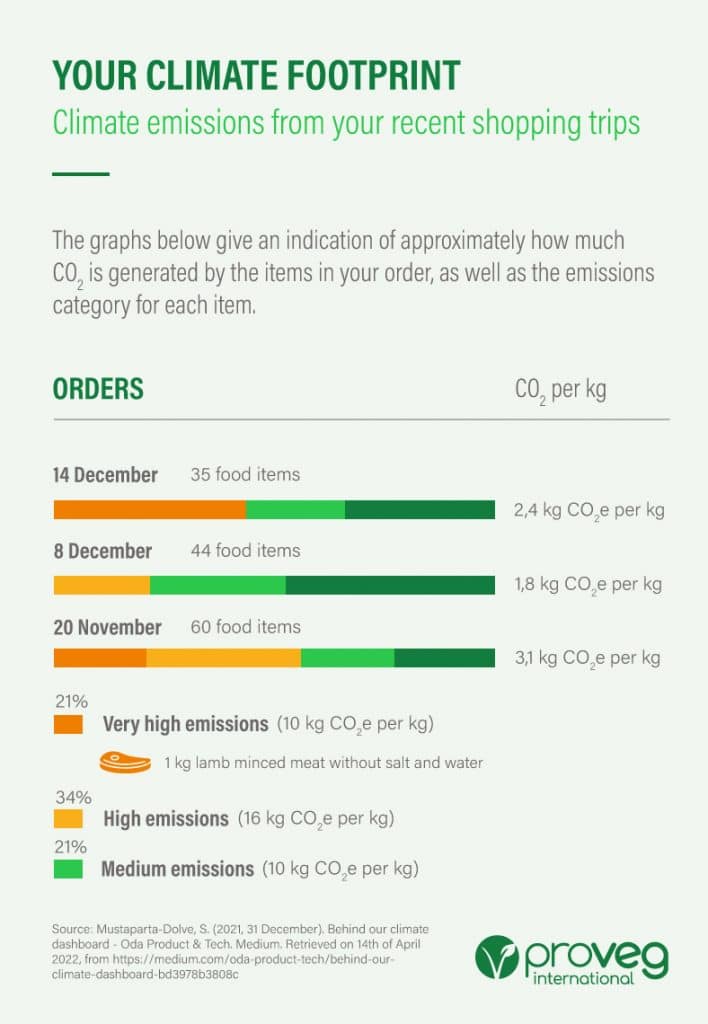
Oda have reported that the climate-impact receipts have proven popular with consumers, and that, since their introduction, they’ve seen a decline in purchases of unsustainable foods such as red meat, and an increase in the popularity of plant-based alternatives.
For an overview and detailed case studies of other eco-friendly labeling initiatives, check out our white paper ‘Environmental-impact labeling: options and impacts for retailers and brands’.
Actions
- Partner with an expert third-party emissions accreditor to help you produce estimates of each shopper’s weekly emissions impact – as well as your overall footprint.
- Try offering discounts or rewards for consumers who reduce their emissions.
- Check out our white paper on emissions labeling for detailed options.
Packaging considerations
Should packaging be part of your sustainability strategy? There are differing views on where retailers and manufacturers should focus, as well as on the impact on consumer behavior. Let’s dive into a case study to see how one national retailer in the UK is leading the way.
Case Study: Iceland’s plastic-free ambitions
In 2018, UK retailer Iceland announced plans to phase out all plastic packaging on their own-label products by 2023. We fully applaud Iceland’s ongoing commitment to more sustainable packaging – and we sympathize with them, because it’s not been an easy ride.
The first difficulty was in overcoming entrenched consumer behaviors. Iceland began piloting plastic-free grocery aisles in 2019, but these were unpopular with customers who were used to the convenience of grab-and-go fruit packs. Sales of fresh fruit and vegetables dropped by a third, forcing the retailer to reverse the change.57
“Recyclable plastic or card-based packaging solutions are ideal but they aren’t what attracts most people to a product”, explained one packaging expert from ABP Food Group in an interview with ProVeg. In other words, a business’s sustainability goals may not always align with consumer preferences. Some initiatives will succeed not because brands are responding to consumer demand, but because they’re showing leadership in the sustainability arena.
Iceland has persevered with plastic reduction across a number of other schemes, and these results are really starting to bear fruit (ahem). For instance, by working with its suppliers, Iceland were able to reduce their own-label plastic packaging by 29% in the first two years. By 2020, they had fully eliminated black plastics (which are often non-recyclable).

Ahead of COP26, Iceland’s Managing Director admitted that hitting the plastic-free 2023 target was looking difficult, citing pandemic setbacks and a “lack of commercially viable innovation.”59As an interim move, they have pledged to become ‘plastic neutral’ from 2022 – by monitoring the amount of plastic they sell and capturing the same volume from oceans in developing parts of the world.60 They’re also trying ‘reverse vending machines’ in their stores, and campaigning for deposit-return schemes.61
Iceland is a great example of a retailer setting ambitious sustainability targets, piloting multiple options, and being responsive to consumer needs. Introducing a loose vegetables section didn’t work for their customers, so they tried another intervention: removing plastic bags.62 They successfully piloted this in a London store in 2019 and are now rolling it out nationwide. Iceland already has 50 stores that are completely plastic-bag free – only selling reusable paper or jute bags. Their commitment to eliminating plastic continues, and, by focusing on low-friction interventions and scaling up pilot projects, they’re embracing solutions that work for consumers, the planet, and their bottom line.
ProVeg works with companies along the entire value chain. Several alumni of the ProVeg Incubator have leveraged our expert network to successfully launch plastic-neutral and plastic-negative products. If you would like to optimize your plant-based products’ sustainability wins – and why wouldn’t you? – reach out to us at [email protected].
If you’re a retailer looking to reduce plastic packaging, and you’re already making great progress in all of those areas Iceland are trying, are there any other easy wins?
Plant-based foods to the rescue! (Again. But only because they’re so good at rescues. They’re like Lassie, but made of vegetables.)
How do plant-based foods help with packaging? Well, many plant-based brands are leading the way on plastic-free, plastic-neutral, and low-carbon products. “We want to showcase that veganism is the most sustainable way of living. We’re working towards being carbon neutral and having the packaging labeled for next year,” explains Joe Hill, co-founder of One Planet Pizza.64 Other plant-based brands are pivoting too – like Oumph!, who are “going into more sustainable packaging made of paper cartons,” according to founder Ankan Linden.65 This is all happening in part because those brands are mission-driven, and in part because consumers are demanding it.
There’s also an economic incentive for transitioning. As well as being cheaper to produce, “plant-based products have lower disposal costs than conventional products, which have complications such as animal blood,” explained one expert we spoke to from ABP Food Group. This is significant because environmental laws are changing, and typically favor products which use upcycled ingredients (including fermentation-enabled protein sources). For example, in 2018, the UK and the EU introduced ‘Extended Producer Responsibility’ laws (EPR), modernizing the 2008 Europe Union Waste Framework Directive to bring it into line with circular-economy principles.66
Circular-economy thinking recognizes that 80% of waste is created at the design stage. Under the new EPR regime, producers will pay the full net end-of-life costs for their products.” 67
This places some fermented mycoproteins made from waste feedstock (e.g. used hops from breweries) at a cost advantage. Those producers will have lower waste-disposal costs compared to animal-based products since they can upcycle bioproducts, with these cost savings passed along the value chain to retailers and consumers.
Are you looking to expand your plant-based range? ProVeg has extensive knowledge of the plant-based sector in Europe, and regularly supports retailers and manufacturers in all aspects of product development and merchandising. Get in touch with us at [email protected].
Actions
- Design your products with circular-economy principles in mind – this will reduce wastage, packaging, and emissions.
- As you increase your plant-based range, use the opportunity to partner with plastic-neutral packaging suppliers.
- Prioritize interventions that make sustainability convenient for consumers – for instance, better packaging and a higher ratio of plant-based products in ready meals.
Reducing food waste
Plant-based foods can also be a way to reduce food waste – so long as you’re strategic about where you stock them and how you merchandise them.
A study by US retailer Kroger found that integrating plant-based alternatives into conventional-meat aisles increased sales of the former by 23% compared to control stores.68 This is important for two reasons. First, flexitarians are more likely to embrace plant-based alternatives when they’re easy to find. Second, it shows that there’s a strong way to mitigate the perceived risk of stocking plant-based alternatives in the chilled section – with the right positioning, pricing, and marketing, they’ll be a hit, and you need not fear wastage. (For more on this, check out our whitepaper ‘5 marketing fails to avoid with plant-based foods’).
Plant-based alternatives lend themselves to reduced food waste in several other ways:
- Ambient products – the global pandemic accelerated consumer demand for shelf-stable products, and that demand has stayed high. Producers have kept up with it, and retailers can now take advantage of delicious plant-based products that are shelf-stable for many months – from confectionery to proteins to beverages.
- Frozen ranges – many plant-based producers, such as Oumph!, cater to the frozen section specifically to reduce food waste. As a result, retailers can take advantage of a huge variety of frozen vegan products. Furthermore, many frozen plant-based products are packaged in cardboard, meaning less plastic, so you’re getting three sustainability wins in one.
- Proteins from side streams – companies worldwide are starting to upcycle food waste into alternative-protein products for human consumption. These products offer huge sustainability benefits and are likely to appear in mass production in 2023 as several facilities come online. This will be a great opportunity to be a market leader in the circular economy.
For more guidance on how plant-based products can help to reduce food waste, check out our white paper ‘Plant-based profit: lucrative low-risk product ranges’.
Actions
- Reduce waste by placing plant-based alternatives alongside conventional animal products – this increases visibility, which drives stock turnover.
- Expand your plant-based frozen and ambient ranges – they’re popular with flexitarians, are often sold in more environmentally-friendly packaging, and the range of options is now huge.
- Consider creating products with upcycled ingredients – these plant-based proteins use circular-economy principles to turn waste streams (e.g. from breweries or bakeries) into tasty and nutritious foods with satisfying texture.
Find out more about fermentation-enabled proteins, which can often be created through upcycling waste streams, in our quick guide.
Local produce, organics, and final considerations
Should you be favoring products that use European ingredients over imports? Or organic products over conventional ones? What about palm-oil that’s certified as sustainable? While all of these considerations have individual merit, they’re a complex and fragmented set of solutions which makes them hard to scale. If your goal is to tackle sustainability in general, you should be looking for the most impactful solution that works across the board.
In order to understand the common solution, we need to identify the common root problem. Intensive farming can lead to soil erosion, water pollution, and heavy pesticide use – so what’s driving it?
It’s industrial animal agriculture. As we outlined earlier, the farming of animals takes up almost 80% of arable land worldwide. It’s the leading cause of deforestation, monoculture, and unsustainability across the global food system.
The animals we eat require enormous amounts of feed – and that feed is routinely supplemented by imported grains. It’s not the travel miles that are the problem here (transportation accounts for less than 10% of food-related greenhouse gas emissions)71 – it’s the fact that these grains are being grown in deforested regions with intensive use of artificial fertilizers and pesticides. Demand for animal feed in the Global North is driving deforestation in the Global South.
Instead of expecting your consumers to climb a mental mountain every time they go shopping, as they earnestly try to discern the most sustainable option, retailers can have an enormous impact. In a single move, you can surpass the individual impact of these other disparate initiatives, and support consumers with the ultimate food sustainability move: making plant-rich diets affordable and accessible
Sustainability and business success go hand in hand…a positive link exists between ESG [Environmental, Social, and Governance] and financial performance.”72
Conclusion
As we saw at the beginning of this paper, consumers want more sustainable retail options, and they want them to be affordable. By accelerating the transition to plant-based eating, retailers can cater to both of these needs. It’s not just the right thing to do for the planet – it’s the right thing for any business that wants to survive into the 2030s.
If you have a fundamental sustainability business model, that adds value to your share price.”
Actions
Simplify your consumers’ sustainability journey into a single convenient and achievable goal: help them shift to a plant-rich diet. This will help reverse the deforestation caused by animal agriculture, cut your food-related emissions in half, and propel you towards your net-zero targets.
ProVeg can help your business with a wide range of interventions across the entire value chain and all aspects of plant-based food manufacture and retail. Find out more in our corporate engagement portfolio.
Note: ProVeg conducts exclusive interviews with a wide range of industry professionals for its New Food Hub white papers. Unless an alternative citation is provided, quotations are from those interviews. Some interviewees wished to remain anonymous.
References
- Cargill (2020): Consumers are Driving Food Manufacturers to Focus on Environmental Sustainability. Available at: https://www.cargill.com/salt-in-perspective/food-manufacturers-focus-on-environment-sustainability Accessed 2022-03-01
- FMCG Gurus (2022): Austria – Sustainability Survey – Q1 2022. Available at: https://fmcggurus.com/consumer-insight-report/sustainability-reports/ Accessed 2022-03-15
- Smart Protein Project (2021): ‘What consumers want: A survey on European consumer attitudes towards plant-based foods. Country specific insights’ European Union’s Horizon 2020 research and innovation program (No 862957). Available at: https://smartproteinproject.eu/consumer-attitudes-plant-based-food-report/ Accessed 2022-02-17
- Forbes (2020): Sustainable Food Trends Will Become Center Of The Plate With Modern Consumers. Available at: https://www.forbes.com/sites/jefffromm/2020/11/10/sustainable-food-trends-will-become-center-of-the-plate-with-modern-consumers/?sh=508ccf544fe6 Accessed 2022-03-01
- McKinsey & Company (2021): The path forward for sustainability in European grocery retail. Available at: https://www.mckinsey.com/industries/retail/our-insights/the-path-forward-for-sustainability-in-european-grocery-retail Accessed 2022-02-07
- Smart Protein Project (2021): ‘What consumers want: A survey on European consumer attitudes towards plant-based foods. Country specific insights’ European Union’s Horizon 2020 research and innovation program (No 862957). Available at: https://smartproteinproject.eu/consumer-attitudes-plant-based-food-report/ Accessed 2022-02-17
- Image source: Deloitte (2021): The conscious consumer. Available at: https://www2.deloitte.com/content/dam/Deloitte/nl/Documents/consumer-business/deloitte-nl-consumer-the-conscious-consumer-summary.pdf Accessed 2022-03-01
- Deloitte (2021): The conscious consumer. Available at: https://www2.deloitte.com/content/dam/Deloitte/nl/Documents/consumer-business/deloitte-nl-consumer-the-conscious-consumer-summary.pdf Accessed 2022-03-01
- Smart Protein Project (2021): ‘What consumers want: A survey on European consumer attitudes towards plant-based foods. Country specific insights’ European Union’s Horizon 2020 research and innovation program (No 862957). Available at: https://smartproteinproject.eu/consumer-attitudes-plant-based-food-report/ Accessed 2022-02-17
- Image source: Smart Protein Project (2021): ‘What consumers want: A survey on European consumer attitudes towards plant-based foods. Country specific insights’ European Union’s Horizon 2020 research and innovation program (No 862957). Available at: https://smartproteinproject.eu/consumer-attitudes-plant-based-food-report/ Accessed 2022-02-17
- Parry, J., & Szejda, K. (2019): How to drive plant-based food purchasing: Key findings from a Mindlab study into implicit perceptions of the plant-based category. Research Report. Washington, DC: The Good Food Institute. Available at: https://go.gfi.org/Mindlab-Strategic-Recommendations Accessed 2022-02-17
- Smart Protein Project (2021): ‘What consumers want: A survey on European consumer attitudes towards plant-based foods. Country specific insights’ European Union’s Horizon 2020 research and innovation program (No 862957). Available at: https://smartproteinproject.eu/consumer-attitudes-plant-based-food-report/ Accessed 2022-02-17
- Image source: The Drum: https://www.thedrum.com/news/2020/01/13/oatly-mounts-first-regional-marketing-campaign Accessed 2022-04-28
- Image source: ProVeg, Data source: McKinsey and Company (2020): The great consumer shift: Ten charts that show how US shopping behavior is changing. Available at: https://www.mckinsey.com/business-functions/marketing-and-sales/our-insights/the-great-consumer-shift-ten-charts-that-show-how-us-shopping-behavior-is-changing Accessed 2022-02-21
- Image source: ProVeg, Data source: Heller, M. C., & Keoleian, G. A. (2018): Beyond Meat’s Beyond Burger Life Cycle Assessment: A detailed comparison between a plant-based and an animal-based protein source. Center for Sustainable Systems University of Michigan for Beyond Meat. Available at: https://css.umich.edu/sites/default/files/publication/CSS18-10.pdf Accessed 2021-11-08
- Kustar, A., & Patino-Echeverri, D. (2021): A Review of Environmental Life Cycle Assessments of Diets: Plant-Based Solutions Are Truly Sustainable, even in the Form of Fast Foods. Sustainability 13(17), 9926. Available at: https://www.mdpi.com/2071-1050/13/17/9926 Accessed 2021-11-08
- Heller, M C and Keoleian, G A (2018): Beyond Meat’s Beyond Burger Life Cycle Assessment: A detailed comparison between a plant-based and an animal-based protein source. Center for Sustainable Systems University of Michigan for Beyond Meat. Available at https://css.umich.edu/sites/default/files/publication/CSS18-10.pdf Accessed 2021-11-08
- Rügenwalder Mühle (2020): Für das Klima – im Sortiment und im Betrieb. Available at: https://www.ruegenwalder.de/klimaschutz Accessed 2021-11-08
- Fresán, U., Mejia M. A., Craig W. J., et al. (2019): Meat Analogs from Different Protein Sources: A Comparison of Their Sustainability and Nutritional Content. Sustainability 11(12), Multidisciplinary Digital Publishing Institute, 3231. Available at: https://www.mdpi.com/2071-1050/11/12/3231
- Lamb A, et al. The Potential for Land Sparing to Offset Greenhouse Gas Emissions from Agriculture. Nature Climate Change. 2016;6: 488
- Herrero M, Wirsenius S, Henderson B, Rigolot C, Thornton P, Havlik P, de Boer I, Gerber PJ. Livestock and the Environment: What Have We Learned in the Past Decade? Annual Review of Environment and Resources. 2015;40: 177–202
- Kustar, A., & Patino-Echeverri, D. (2021): A Review of Environmental Life Cycle Assessments of Diets: Plant-Based Solutions Are Truly Sustainable, even in the Form of Fast Foods. Sustainability 13(17), 9926. Available at: https://www.mdpi.com/2071-1050/13/17/9926 Accessed 2021-11-08
- Xu, X., Sharma, P., Shu, S., et al. (2021): Global greenhouse gas emissions from animal-based foods are twice those of plant-based foods. Nature Food 2(9), 724–732. Available at: https://www.nature.com/articles/s43016-021-00358-x
- Poore, J., & Nemecek, T. (2018). Reducing food’s environmental impacts through producers and consumers. Science, 360(6392), 987-992.
- National Health Service (n.d.): The vegan diet. Available at: https://www.nhs.uk/live-well/eat-well/the-vegan-diet/ Accessed 2022-02-21
- Poore, J., & Nemecek, T. (2018). Reducing food’s environmental impacts through producers and consumers. Cited in Ritchie, H (2021): If the world adopted a plant-based diet we would reduce global agricultural land use from 4 to 1 billion hectares. Our World in Data. Available at https://ourworldindata.org/land-use-diets Accessed 2022-02-21
- Parry, J and Szejda, K (2019): How to drive plant-based food purchasing: Key findings from a Mindlab study into implicit perceptions of the plant-based category. Research Report. Washington, DC: The Good Food Institute. Available at: https://go.gfi.org/Mindlab-Strategic-Recommendations Accessed 2022-02-17
- The Decision Lab (n.d.): Why do we tend to think that things that happened recently are more likely to happen again? Available at: https://thedecisionlab.com/biases/availability-heuristic Accessed 2022-02-23
- Vegconomist (2020): Germany: Rügenwalder Mühle Sees 50% Increase in Meat-Free Sales. Available at: https://vegconomist.com/companies-and-portraits/germany-rugenwalder-muhle-sees-50-increase-in-meat-free-sales Accessed 2022-02-25
- Rügenwalder Mühle
- FOCUS Online (2021): Rügenwalder CEO Michael Hähnel, interviewed in ‘Nach Greta nun Corona: Rügenwalder-Chef erklärt, wie der Veggie-Boom befeuert wird’. Available at: https://www.focus.de/finanzen/news/ruegenwalder-chef-pandemie-hift-dem-veggie-trend_id_13271823.html Accessed 2022-03-15, translated via DeepL.
- Nestle UK press conference, June 2021
- Image source: ProVeg
- Image source: Penny/ https://www.penny.de/erleben/eigenmarken/foodforfuture
- Stefan Magel, Divisional Director Retail Germany at REWE Group and COO of PENNY, qtd. In Rewe Group (2021): Klimaneutrale vegane Eigenmarke Food For Future: PENNY kompensiert über 16.000t CO2. Available at: https://www.rewe-group.com/de/presse-und-medien/newsroom/pressemitteilungen/ne-eigenmarke-food-for-future-penny-kompensiert-uber-16-000t-co2/ Accessed 2022-02-28, translated by Rewe.
- Howard Schultz qtd. in Zsurzsan, A (2014): 10 Powerful Quotes from Industry Leaders that will Inspire You to Empower Your Employees. Available at: https://transcosmos.co.uk/blog/10-quotes-employee-empowerment/ Accessed 2022-02-21
- Image source: ProVeg
- Confidential ProVeg interviews with sustainability leaders at two major European retailers, October 2021
- Image source: GFI, https://gfi.org/wp-content/uploads/2019/04/MARCH_FINAL-3_18_OP1-2.jpg Accessed 2022-02-21
- Interviewed by ProVeg International, January 2022
- Interviewed by ProVeg International, January 2022
- Bundesministerium für Ernährung und Landwirtschaft (2020): Forsa-Befragung des Bundeslandwirtschaftsministeriums zu Fleischkonsum / Ernährungsverhalten. Available at: https://www.bmel.de/SharedDocs/Meldungen/DE/Presse/2020/200524-fleischkonsum-ernaehrungsverhalten.html Accessed 2021-07-21
- Image source: ©-Heura-Foods/ https://vegconomist.com/marketing-and-media/vegan-advertising-101-with-spanish-food-activists-heura/
- Image source: Branding Cuisine https://www.brandingcuisine.com/reference/bio-company/
- Good Food Institute (n.d.): New studies further the case for cultivated meat over conventional meat in the race to net-zero emissions. Available at: https://gfi.org/press/new-studies-further-the-case-for-cultivated-meat-over-conventional-meat-in-the-race-to-net-zero-emissions/ Accessed 2022-02-22
- Image source: ProVeg
- Food Ingredients First (2022): Cultured beef heads to US store shelves as meat industry hits “crossroads”. Available at: https://www.foodingredientsfirst.com/news/cultured-beef-heads-to-us-store-shelves-as-meat-industry-hits-crossroads.html Accessed 2022-02-22
- ProVeg International (2020): Promising Levels Of Consumer Acceptance Of Cultured Meat In Europe. Available at: https://proveg.com/blog/promising-levels-of-consumer-acceptance-of-cultured-meat-in-europe/ Accessed 2022-02-22
- Good Food Institute (n.d.): New studies further the case for cultivated meat over conventional meat in the race to net-zero emissions. Available at: https://gfi.org/press/new-studies-further-the-case-for-cultivated-meat-over-conventional-meat-in-the-race-to-net-zero-emissions/ Accessed 2022-02-22
- Kearney (2019): How Will Cultured Meat and Meat Alternatives Disrupt the Agricultural and Food Industry. Available at: https://www.kearney.com/documents/20152/2795757/How+Will+Cultured+Meat+and+Meat+Alternatives+Disrupt+the+Agricultural+and+Food+Industry.pdf/06ec385b-63a1-71d2-c081-51c07ab88ad1?t=1559860712714 Accessed 2022-02-23
- Fuchs qtd. in Buxton, A. (2022): Norwegian Consumers Ditch Red Meat After Carbon Footprint Is Printed On Oda Grocery Receipts. Available at: https://www.greenqueen.com.hk/red-meat-carbon-footprint-oda-norway/?_ga=2.265474637.373928580.1643225510-439033744.1641894536 Accessed 2022-02-22
- Deloitte (2021): The conscious consumer. Available at: https://www2.deloitte.com/content/dam/Deloitte/nl/Documents/consumer-business/deloitte-nl-consumer-the-conscious-consumer-summary.pdf Accessed 2022-03-01
- Image source: ProVeg
- Lucas, L., & Clark, P. (2012): Tesco steps back on carbon footprint labeling. Available at: https://www.ft.com/content/96fd9478-4b71-11e1-a325-00144feabdc0 Accessed 2022-02-22
- Foundation Earth (2021): More global food giants and leading retailers join Foundation Earth as eco-labelling drive gathers pace. Available at: https://www.foundation-earth.org/global-giants-join-foundation-earth/ Accessed 2022-02-22
- Image source: ProVeg, Data Source: Oda, https://medium.com/oda-product-tech/behind-our-climate-dashboard-bd3978b3808c
- Smith, B. (2021): Iceland Could Miss Plastic-Free Target, Admits Boss. Available at: https://www.grocerygazette.co.uk/2021/11/04/iceland-plastic-free/ Accessed 2022-02-22
- Image source: Doing it Right, https://sustainability.iceland.co.uk/news/uk-first-as-iceland-sells-mince-pies-free-from-plastic-packaging/
- Quoted in https://www.grocerygazette.co.uk/2021/11/04/iceland-plastic-free/ Accessed 2022-02-22
- Iceland (2021): UK first as Iceland sells mince pies free from plastic packaging. Available at: https://sustainability.iceland.co.uk/news/uk-first-as-iceland-sells-mince-pies-free-from-plastic-packaging/ Accessed 2022-02-22
- Iceland (n.d.): Tackling Plastic Pollution. Available at: https://sustainability.iceland.co.uk/our-planet/plastics/ Accessed 2022-02-22
- Iceland (n.d.): Tackling Plastic Pollution. Available at: https://sustainability.iceland.co.uk/our-planet/plastics/ Accessed 2022-02-22
- Image source: One Planet Pizza in Female First, https://www.femalefirst.co.uk/vegan/one-planet-pizza-moves-to-100-percent-recyclable-packaging-1208192.html
- Interviewed by ProVeg International, December 2021
- Interviewed by ProVeg International, October 2021
- Official Journal of the European Union (2018): Directive (Eu) 2018/851 Of The European Parliament And Of The Council of 30 May 2018 amending Directive 2008/98/EC on waste. Available at:https://eur-lex.europa.eu/legal-content/EN/TXT/PDF/?uri=CELEX:32018L0851&rid=5#:~:text=A%20definition%20of%20extended%20producer,a%20product’s%20life%20cycle%20including Accessed 2022-02-22
- Croner-i (2020): What is extended producer responsibility? Available at: https://app.croneri.co.uk/questions-and-answers/what-extended-producer-responsibility Accessed 2022-02-22
- Plant-Based Foods Association (2020): Plant-Based Meat Sales Increase an Average of 23% When Sold in the Meat Department. Available at: https://www.plantbasedfoods.org/plant-based-meat-sales-increase-an-average-of-23-when-sold-in-the-meat-department/ Accessed 2022-02-22
- Image source: ProVeg, Original: GFI, https://gfi.org/resource/merchandising-retail/
- Image source: ProVeg
- Ritchie, H. (2020): You want to reduce the carbon footprint of your food? Focus on what you eat, not whether your food is local. Our World in Data. Available at: https://ourworldindata.org/food-choice-vs-eating-local Accessed 2022-02-18
- McKinsey & Company (2021): The path forward for sustainability in European grocery retail. Available at: https://www.mckinsey.com/industries/retail/our-insights/the-path-forward-for-sustainability-in-european-grocery-retail Accessed 2022-02-07

